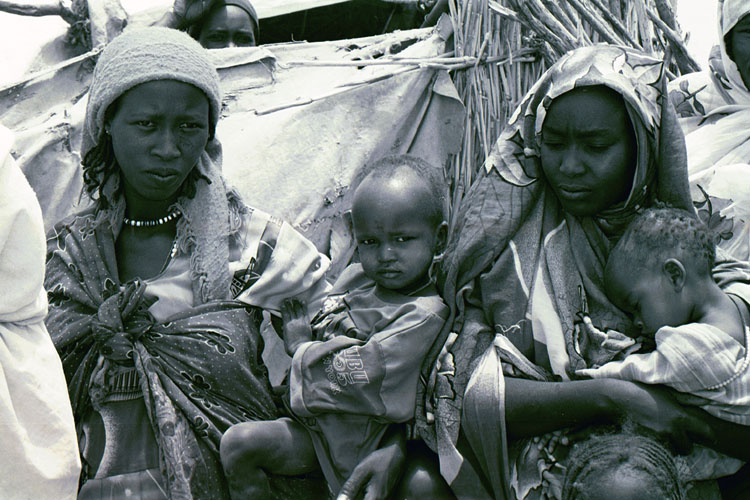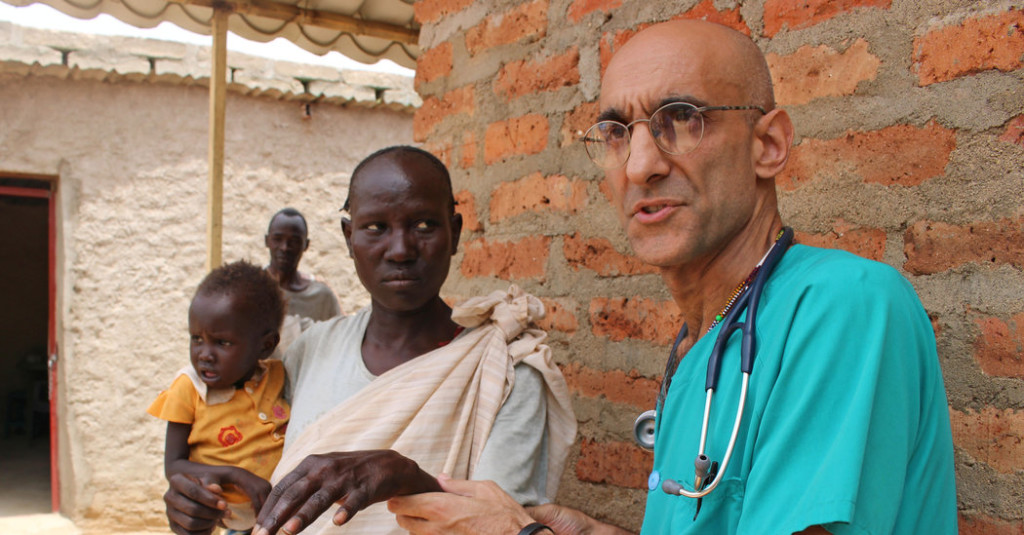Genocide Watch exists to predict, prevent, stop, and punish genocide and other forms of mass murder. Our purpose is to build an international movement to prevent and stop genocide.
Staff Login
Sudan: Expedient, euphemistic efforts to buy a halt to migration from Africa to Europe
European Hypocrisy on Sudan: Expedient, euphemistic efforts to buy a halt to migration from Africa to Europe
Eric Reeves, Top News, Briefs & Advocacy
7 April 2016
I have written recently about the growing international embrace of the Khartoum regime (the first of a three-part analysis: “The International Embrace of Khartoum Deepens: With what consequences for Sudan? Introduction and overview,”. I note in particular the dramatic improvement in relations between the European Union (and EU countries) and Khartoum. This extends to support for the terribly misbegotten “roadmap” proposal from the African Union’s Thabo Mbeki,nominally to bring about peace with the coalition of rebels groups known as Sudan Revolutionary Front (see “A Diplomatically Corrupt Thabo Mbeki Offers His Latest ‘Roadmap for Sudan,’” March 22, 2016 and Sudan Tribune,March 24, 2016). But the Mbeki “roadmap” was never viable, and Khartoum’s massive, well-planned, and intensifying, military offensives in South Kordofan and Blue Nile show the regime had no plans for a ceasefire, the key preliminary element in any meaningful agreement.
Today the Sudan Tribune published an op/ed by Neven Mimica, European Union Commissioner for International Cooperation and Development, who recently traveled to Khartoum. It is an extended whitewashing of Sudan’s realities and speaks with a naiveté—or cynicism—about the Khartoum regime that is simply breathtaking.
In announcing a series of grants amounting to €155 million, Mimica managed in the space of 700 words to offer a series of absurdly tendentious assertions and expectations:
• The National Islamic Front/National Congress Party regime is “trying to rescue a national dialogue process.”
• The regime is attempting to “address a highly volatile economic situation.”
• Mimica declared that, “strengthened cooperation and dialogue [between the EU and Khartoum] would benefit all of us.”
Darfuri refugees in eastern Chad—some 350,000 people of little concern to the EU (photograph by the U.S. Holocaust Memorial Museum, Committee on Conscience)
• Announced a grant of “€15 million, in order to improve the living conditions of refugees and host communities in East Sudan (Kassala) and Khartoum, and to strengthen the capacity of local authorities.”
• Announced “a regional €40 million programme on Better Migration Management, which supports the Khartoum process [stemming migration to Europe].”
• Most disingenuously, Mimica announced a “development aid package of €100 million to tackle the root causes of instability, irregular migration and displacement, which will be implemented in East Sudan, Darfur and the Transitional Areas of Southern Kordofan and Blue Nile. It will increase access of vulnerable people, including IDPs, refugees and returnees, to jobs, education and health.”
• Anticipating skepticism about the regime’s willingness to use these monies for the purposes specified, Mimica declared: “The real challenge in the coming months will be the implementation of this package. I received a firm commitment of the Sudanese authorities to remove all obstacles and facilitate access, visas and travel permits to areas where EU projects will be implemented.”
[Here again, in speaking about a “firm commitment” from the Khartoum regime, there is either culpable ignorance or unforgiveable cynicism: the present regime, which came to power by military coup 27 years ago, has never abided by a single agreement with any Sudanese party—not one, not ever. The hindering of international movement and travel by means of stalling or denying visas, as well as travel permits, remains—and will continue to remain—a critical obstacle to the goals Mr. Mimica announces. “Implementation” is indeed the key word—and Khartoum’s record could not be less encouraging—ER]
• Mimica went on to “[stress] the need for the national dialogue process to be inclusive, with guaranteed fundamental freedoms and more confidence-building measures.”
[The suggestion that “fundamental freedoms” or political “inclusiveness” have any part of the regime’s vision of the future is simply preposterous—and Mr. Mimica certainly must know this—ER]
…and that “The latest initiative by President Mbeki is an important opportunity that should not be neglected.”
[Again, see “A Diplomatically Corrupt Thabo Mbeki Offers His Latest ‘Roadmap for Sudan,’” March 22, 2016 |
• Mimica further declared, “I am confident that we can achieve results quickly to the benefit of the people of Sudan.”
[This sort of “confidence” is easy to announce, but is wholly misplaced and unwarranted—ER]
• And finally, Mimica declared that he “expressed clearly our concern about the continued tension and conflict in Darfur, South Kordofan and the Blue Nile…”
…and that the “European Union values Sudan’s role at the regional level [and] I encouraged constructive engagement in particular in Libya.”
Let me note that this last claim about the “value of Sudan at the regional level” comes a month after the release of findings by the UN Panel of Experts for Libya, which in its March 9, 2016 report notes that Khartoum has for more than a year and a half been arming and supporting radical Islamists in neighboring Libya, further destabilizing an already chaotic country. The Panel of Experts reported that the Khartoum regime Mr. Mimica speaks about had repeatedly and consequentially violated the UN arms embargo on Libya, transferring helicopter gunships, ammunition, and other materiel (documented pages 34 – 37). Unsurprisingly, the Panel notes many instances of Khartoum’s failure to cooperate with this important work.
Has Mr. Mimica bothered to read this important UN document, which makes hash of his declaring in the same sentence that the EU “values Sudan’s role at the regional level” and has “encouraged constructive engagement in particular in Libya”?
But most appalling in this entire litany of expediency and disingenuousness is the euphemistic description of ongoing genocidal destruction in Darfur, South Kordofan, and Blue Nile: in Mr. Mimica’s view this is evidently adequately summarized as “tension and conflict.”
Others disagree. Yesterday I received a series of photographs from Dr. Tom Catena, the only surgeon operating in the Nuba Mountains. Over the past five years he has treated many hundreds of the many thousands of ghastly and often fatal shrapnel wounds suffered by the people of the Nuba at the hands of Khartoum’s military aircraft—aircraft that are wholly indiscriminate in their targeting. Outraged by reports of Saudi Arabia’s commitment to provide billions of dollars in military assistance to the Khartoum regime, Dr. Catena wrote to me offering a series of searingly ironic captions for photographs of wounded civilians; these photographs may be found at ]?(Caution—they are extremely gruesome and disturbing, even as they are an essential feature of the “tension and conflict” that Mr. Mimica speaks of so glibly).
Dr. Catena, in a rare moment of anger, appends the following captions to photographs of victims:
“Thank you Omar Bashir and your Saudi friends”
“Another beneficiary of Saudi largesse”
“Enemies of the Khartoum regime”
“Thank you House of Saud”
I have been privileged to know Dr. Catena for several years and to have interviewed him at length three years ago. Nicholas Kristof of the New York Times met with Dr. Catena last year wrote a column that concluded with an extraordinary celebration of Dr. Catena by the Nubans he has done so much to help:
Certainly the Nubans (who include Muslims and Christians alike) seem to revere Dr. Tom. “People in the Nuba Mountains will never forget his name,” said Lt. Col. Aburass Albino Kuku of the rebel military force. “People are praying that he never dies.” A Muslim paramount chief named Hussein Nalukuri Cuppi offered an even more unusual tribute. “He’s Jesus Christ,” he said.
Er, pardon?
The chief explained that Jesus healed the sick, made the blind see and helped the lame walk — and that is what Dr. Tom does every day. You needn’t be a conservative Catholic or evangelical Christian to celebrate that kind of selflessness. Just human. (New York Times, June 17, 2015)
For Dr. Catena to be moved to such bitter irony is finally not surprising. His hospital near Kauda in the center of the Nuba Mountains has been repeatedly and deliberately attacked by military aircraft of the Khartoum regime. These same aircraft have produced thousands of victims of the sort represented by the photographs I received yesterday, and have posted today. Hundreds of thousands have fled these aerial attacks, and roughly 300,000 of them are refugees in South Sudan or Ethiopia—evidently refugees of a sort only marginally of concern to the EU.
Unaccompanied minors from the Nuba Mountains in Yida refugee camp, South Sudan–not a particular concern to the EU or for that matter the UN High Commission for Refugees (photograph by Trevor Snapp)
So I would urge Mr. Mimica, the members of the European Union, the African Union, the Arab League, the UN Secretariat and Security Council, and so many others that have turned a blind eye to Khartoum’s atrocities: as you embrace this brutal regime, be aware of how just bloody yours hands will—and indeed have already—become.
© 2016 · Eric Reeves


























































